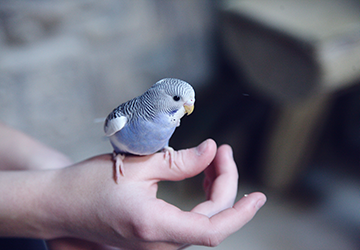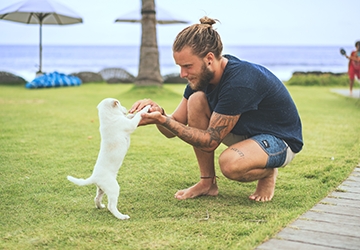Introduction:
Are you looking for an easy and enjoyable way to expand your social circle? If so, why not consider getting a pet? Owning a pet can be incredibly rewarding on both an emotional and practical level, not least because it provides endless opportunities for expanding your social life. Not only can having pets around bring companionship and joy into your life, but they can help foster meaningful relationships with others in ways you might never have considered. In today's blog post, we'll look at why having a pet can improve your social life, the various types of pets best suited for this purpose, and tips on how to train your pet to be more social. So if you're looking for a furry companion to help fill your social void, keep reading!
How Can Pets Improve Your Social Life?
Having a pet can be one of the best ways to improve your social life. Studies have shown that owning a pet increases interaction with other people and relieves stress and depression. Let's explore how having a pet can improve your social life.
1: Meeting New People –
Pets can be a great way to meet new people, especially if you don't have many friends or don't socialize much. People are naturally drawn to animals, so taking your pet for a walk or accompanying them on errands is a great way to start conversations and make new connections. You can join a local club or organization dedicated to your pet's breed!
2: Stress and Anxiety Reduction –
Having a pet can help to reduce stress and anxiety levels, which in turn can make socializing easier. A study found that just 10 minutes of interacting with a pet reduced cortisol levels - the hormone released when we experience stress. This can relieve anxiety and fear and make approaching and engaging with people easier.
3: Caring for Someone Else –
Caring for a pet is a gratifying experience that can help improve your confidence and self-esteem. Knowing you are responsible for the health and well-being of another living creature can give you a sense of purpose and pride, making it easier to form meaningful relationships with others.
4: Improved Mood –
Pets can also help boost your mood and make interacting with others easier. Petting an animal releases serotonin, a hormone associated with happiness and relaxation - perfect for social gatherings. Additionally, playing with or walking a pet provides excellent exercise, which has been proven to improve mental health and reduce symptoms of depression.
5: Unconditional Love –
No matter what, a pet will always love you unconditionally. This can provide an incredible sense of comfort and reassurance, making it easier to socialize with others. Knowing that you have something or someone who loves you no matter what can be incredibly liberating and help you form stronger connections with the people around you.
Overall, having a pet can be an excellent way to improve your social life. Pets provide companionship and unconditional love, reduce stress and anxiety, and even help you meet new people! So consider getting a pet today - you never know what opportunities for friendship and connection may bring!
Types of Pets That Socialize Well?
When it comes to socializing, some pets are better at it than others. Cats and dogs, for example, are both known for being very social animals who can fit in well with other people or animals. But several different types of pets may surprise you with their ability to be great companions and friends.
1: Birds –
Birds can make for great social companions! Parrots, in particular, are known for their intelligence and ability to imitate human behaviors. They need lots of attention and stimulation from their owners, but when they settle into a home environment, they can be very loving and affectionate. Plus, they can help keep you company with their chirps and singing!

2: Rabbits –
Rabbits can be great pets for those looking for a social companion. They're intelligent animals who require lots of attention and interaction to remain happy. They need plenty of space to move around, but they can be affectionate and loving when handled with care. A rabbit's personality is unique; you'll always enjoy watching them hop around!
3: Reptiles –
Reptiles may not seem like the most social pet option, but some species can thrive in a home environment when given the proper care and attention. Turtles, for example, are known for being amiable animals who enjoy interacting with their owners. They need a secure enclosure and adequate diet to stay healthy, but they can be an excellent companion when loved and cared for!
4: Fish –
Fish may not be the first thing that comes to mind when you think of socializing pets, but several species do quite well in a home environment. Goldfish and guppies, for example, can form strong bonds with their owners. They need regular upkeep and maintenance, but watching them swim around in their tank can be a very calming and rewarding experience.
5: Rodents –
Rodents like hamsters and gerbils can make for wonderful social companions. They need attention and interaction to remain happy but can be very affectionate when handled with care. They're small enough to fit into your pocket so that you can take them along on adventures!
No matter what type of pet you choose, it's important to remember that they will need lots of love and attention. With the proper care, any pet can be a great companion eager to socialize with its owners and others. Remember this when choosing your next furry (or scaly) friend!
How to Train Your Pet to Be Social?
Training your pet to be social is essential to owning one and fostering solid relationships with others and animals. It can also help reduce unwanted behaviors. The following steps will help you teach your pet to be more social:

1: Begin Slowly –
The first step in training your pet to be social is to begin slowly. Take them for short walks in quiet areas like a park or quiet street. This will help them get used to sights and sounds outside the home. Bring treats and reward your pet for good behavior, like sitting when asked or following commands.
2: Introduce them to other people and pets –
Once your pet is comfortable with their surroundings, introduce them safely to other people and pets. Ensure that owners of the other animals know your pet's behavior and that you always have control over your pet. Letting your pet meet and greet other people slowly will help them become accustomed to different kinds of people and other animals.
3: Use Positive Reinforcement –
Positive reinforcement is critical when training your pet to be social. Give treats and verbal praise for good behavior, like sitting quietly or following commands. Avoid negative reinforcement, like scolding or punishing your pet for making mistakes. This can lead to anxiety and fear in your pet, making socializing more difficult.
4: Practice Good Manners –
Finally, practice good manners with your pet outside the home. Teach them to sit when asked and walk alongside you without pulling on the leash. Ensure their barking and jumping are minimal when around other people or animals. These are essential social skills for your pet to learn, which will help them be comfortable at home and in public settings. You can help your pet become a well-mannered, social companion with patience and consistency.
Relevant Questions:
Q: How do you have a social life with a dog?
A: An essential part of social life with a dog is allowing them to interact with other dogs. This can be done through trips to the dog park, group walking sessions, or visits to doggy daycare. By finding the right balance of attention that meets your dog's needs, you can ensure that your pup has plenty of opportunities to enjoy a fulfilling social life.
Q: Are pet owners more social?
A: Yes! Pet owners report higher levels of social capital in their communities than people without pets. They often have better connections with others, deeper trust, and improved health and well-being. Having a pet can be a great way to build community and foster meaningful relationships.
Q: Which pet is most social?
A: Dogs are considered the most social pet animals and make great companions for life. They form strong bonds with their owners and tend to be very loving and loyal. Cats, Pot-Bellied Pigs, Rabbits, Fancy Rats, Guinea Pigs, Horses, and Cockatoos can also be affectionate pets that bring joy to your home and life. Ultimately, the best pet for you will depend on your lifestyle, living situation, and personal preferences. Researching each type of animal is the best way to determine which one may be a good fit for you. Additionally, consulting with professionals who know more about these types of animals can help you decide which pet will be most compatible. Whichever animal you choose, you'll have a new best friend to keep you company and provide unconditional love!
Conclusion Paragraph:
In conclusion, pets can bring immense joy by being companions who offer unconditional love. They can improve our lives in countless ways:
l Increasing physical, mental, and emotional well-being
l Offering support when needed
l Teaching us the wisdom of patience, tolerance, and acceptance
When trained properly- and with a bit of effort and patience- they can connect you to a new universe of relationships that bring more fun and fulfillment into everyday life. So if you're looking for something new to brighten your day and widen your circles, investing in a pet might be the thing to do! Why not explore different types of pets that match your lifestyle and understand how to train them properly? When done responsibly, you'll get far more than an adorable creature–you'll gain a lasting connection and positive impact on your social life that only animals can provide. So take the plunge today – it could improve your life!





